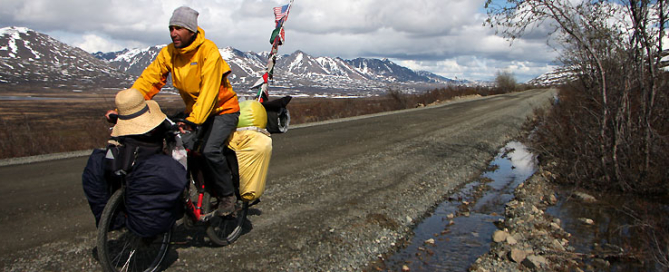Alaska – 106,784 Km


The flight from Los Angeles landed in Anchorage late in the afternoon. It took me three hours to assemble the bike and each of the saddlebags in detail. Then I left the airport riding in the rain. Fortunately I stayed in Chris’s house, an American from Minnesota who I had stayed with nine years ago when I met him in Addis Ababa, Ethiopia. It was a surprise to receive his email just weeks before flying to Alaska. Chris followed me on my website.
That afternoon, he was not in town so he left his house key hidden for me; another good example of the American kindness and hospitality.
During my stay in Anchorage I bought some camping gear and things for the bike. I also went to the weekend market, where his manager asked me to pay 95 usd if I wanted to spend the day selling my book. “We are all the same here, and we do not make differences. If you want to stay you have to pay upfront like everybody else,” he told me raising his voice.
During those days I thought I was used to Alaska. Due to the tilt of the planet, in summer it never gets dark and the nights are nothing but an endless sunset. The first day on the road I camped at 10:00 pm, but I only got to sleep after 02:00 am. The light bothered me as much as my fatigue. I had the feeling that it was always 7:00 in the afternoon. Since then my schedule was shifted for the rest of my tour of Alaska. I never stopped cycling before 01.00 am. Some days I got to sleep after 3 or 4 in the morning.
On the second day I started riding later than normal; and because I couldn’t find a good place to camp I pedaled 169 km. When I started setting up the tent it began to rain hard and it lasted all night long. I went to sleep and after a while the presence of an animal sniffing around the tent woke me up.
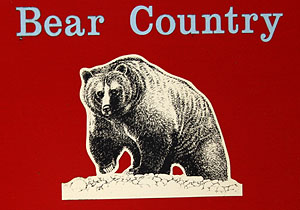
I had already been warned about the bears, who are attracted by the smell of food, shampoo, toothpaste and even repellent. That’s why it is advised to keep everything in a bear-resistant cupboard at least 100 meters from the tent, or if that’s not possible, to hang the food from a tree at the same distance. I did not have such a box and I must confess I did not take the other precaution, because due to my fatigue and the rain I could just think of going to bed. But I had with me pepper spray for bears and a little bell to scare them away which I bought in Anchorage. I don’t know which animal approached me, and in such a state and in the cold I did not want to know it either. I opened the sleeping bag and I rang the bell for a while. The animal was gone, but soon it returned and woke me up again, so I repeated the operation. And again I was saved by my little bell.
In the morning I woke up with wet underwear. The sleeping bag, the insulation, the clothing and even my shoes were also wet. Just after 2:00 pm, still in the rain, I decided to leave the tent, cook oatmeal and start pedaling. The next stop was 35 km away, where according to my map there was a petrol station, with restaurant and accommodation. Almost powerless, feeling bad and under the rain I pedaled for over 2 hours to get there.
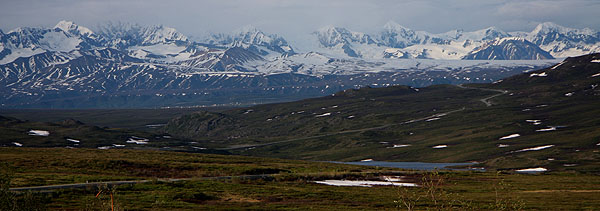
But in Alaska half of the homes or inns by the road are abandoned. It seems that “the dream of building a cabin and live in Alaska” is frustrated after spending the first years. On the road, I have passed by dozens of places that were totally abandoned and looted, and that were invaded by the bush, with broken glasses and rubbish all around them. I had arrived to one of those inns, its huts were closed except for one which had its door tied with a wire. That was like a blessing. I quickly carried water from the lake, boiled it to drink it, and after having dinner I threw myself down to the floor to sleep. In the middle of the night I woke up several times trembling, with barely no strength to pick up the tiny package of drugs. And I thanked Heaven when I found among them paracetamol. It was still raining nonstop.
The next day I was totally knocked out. I could not even get up to go to urinate. I spent all day lying on the floor, and cooking was as tough as the hardest of my journeys. I do not know where my power came from. At times I felt like the character of the film: “Into the Wild”.
As few times on my trip I reflected upon the miserable moments that I had lived. In Alaska, as in the last countries I visited, the cheapest room costs 70 usd and the tent is the only alternative. Only when I’m lucky someone invites me to stay for a day or two. While delirious, some of the hardest journeys I have faced came to my mind; such as Mongolia, Tibet or the endless Australia. Then I wondered why so much suffering.
I imagine this is more than a challenge, no matter how hard it is. It is about going through every remote corner just with my bike to take with me every one of those moments embedded under my skin forever. Being alone in such extreme situations makes me stronger. “I can’t give up,” I think. And then, that inner strength appears, as if it arises from the soul. So I shout loudly: Come on Pablito!” Overcoming these lapses when I only wish to be at home and be a normal guy fills me with life.
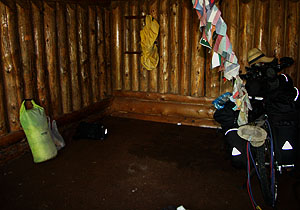
After two days in the cabin, and still feeling weak and on the verge of having a relapse, I left to the next stop which was about another 50 km away. Among more ups than downs I asked for help to a couple of cars. I thought they could bring me to the city of Fairbanks, which was about 300 km, but no one stopped. However, the biggest disappointment was when I got to the other inn that was also abandoned. There, I barely had the energy to cook and just because the sun came up I decided to pedal another 40 km to get to Cantwell. That afternoon I was rewarded while crossing one of the most beautiful landscapes that I had seen in Alaska. Besides, the road started to go down. When I arrived at Cantwell, a small town, I sat in a restaurant and ordered one of the few options in the menu, a burger and “homemade” fries. They really upset my stomach, the potatoes were completely burned; but I did not want to complain and I ate them all the same. It was the last meal I ordered in a restaurant in Alaska, they were so bad and so expensive. I saved the energy for cooking and for asserting my rights to set up the tent on the outskirts of the town. However, I didn’t realize how close I was to a cage of sled dogs, who howled all night; well “night” is a way to say …. Anyway, that day I slept like a baby, the first time I managed to do it since coming to Alaska.
The next day I finally felt a little better, but the dilemma was which route to choose. The path that led me to Fairbanks is the main road, it is paved and therefore the busiest and safest; but it is boring if compared to the Denali Highway, which from the beginning had been my goal. This is a gravel road in poor conditions and is the highest in Alaska. It was therefore a risky and desolate route for me due to my state. In addition to any problem that I might have because the bike was not 100% as it should have been.
But the village policeman who gave me the information told me it was the most beautiful route across the state, and if I wanted to have a real experience of “deep Alaska” I should take it, but I also had to take precautions due to the presence of wolves and bears.
Finally after breakfast, I bought some food, loaded 5 liters of water and went into the Denali Hwy, being heavier than ever.
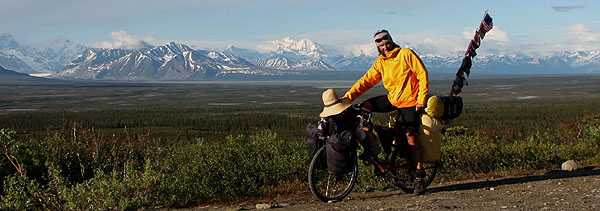
And it was worth it, because that route was one of the nicest I’ve ridden in my entire trip, with endless ups and downs, but with vast landscapes outlined by mountain ranges with snowy peaks.
The first night I camped next to the road, and as there were no trees to hang all the food and other things, I approached Payuk and Dika’s vehicle and they stored all that smelled while I camped 200 meters from them.
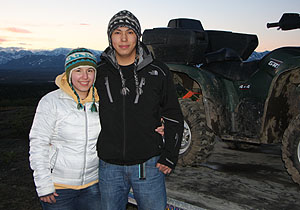
Payuk and Dika were native Alaskan and belonged to the ethnic group Inupiaa. According to what I was explained, nearly 20% of the population in Alaska is composed of indigenous peoples. Most natives live in rural areas, often in remote villages, where they have a predominantly survival lifestyle. Also known as Eskimos, the various indigenous peoples inhabiting the Arctic regions of America and parts of Siberia have physical characteristics that help them survive in the cold. Its origins date back more than 4,000 years ago, and have always had a nomadic life, following the migration of the animals they hunt, among which can be highlighted the caribou, bears, whales and seals. From these and other animals they use every possible part to keep themselves warm, build houses, tools to hunt and feed even in the harsh Arctic winter.
But in recent decades a huge economic growth has emerged with the discovery of very important oil fields and the exploitation of other minerals such as gold, silver, zinc, iron and copper in Alaska. The major milestone in its development has been the building of a pipeline, which started in 1974, of over 1,200 km long that links Prudhoe Bay on the Arctic Ocean to the port of Valdez on the Pacific Ocean. Since then oil has also been the source of some disasters, like the oil spill caused by the Exxon Valdez tanker ship in 1989 which has been described as one of the biggest ecological disasters in history.
“At the end of the last century, indigenous peoples began forming private organizations to defend our interests,” Payuk told me. “They have had significant achievements related to the recognition of land rights, for example. They also discuss common problems, and they lobby in favour of indigenous communities in the planning of the economic development, promoting environmental conservation. In many cases, entire communities were compensated and assisted on health needs, education and their development. However, this has resulted in degradation of indigenous culture in the Arctic. Before, the family head was proud of hunting and sharing with other families the dam obtained, whereas now, many people of the younger generations are more dependent on alcohol. “
For three days I went through the Denali Hwy where I always managed not to sleep with food. Luckily, I have not come across bears or wolves. After 10 days on the road I got to Tok where Chip welcomed me, an American who has lived in Alaska Arizona for several years. Chip was like an angel to me because he lent me his RV for a week, where I recovered and I put on a few kilos.
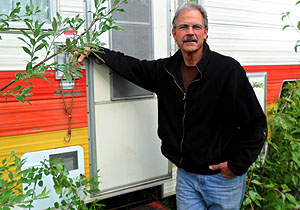
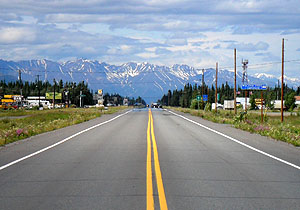
Then I went back to the road, destination Canada.[:]


